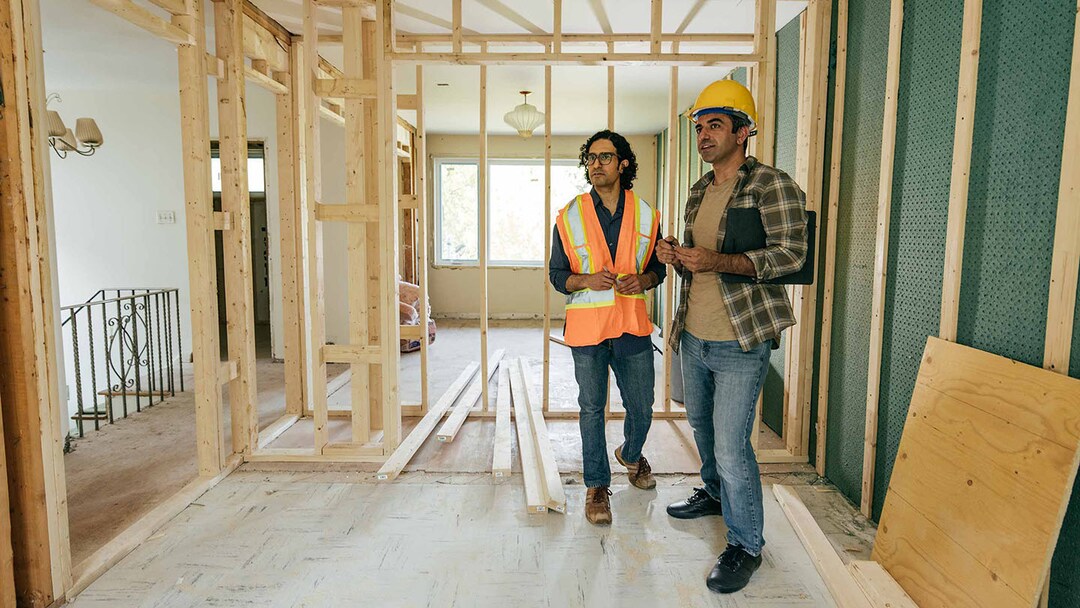Home additions: Popular types, cost and more

Life gets in the way, big changes happen and sometimes, we might realize we need more space than our treasured home has to offer. Luckily, homeowners don't have to immediately put their house on the market if they discover they need an additional bedroom or home office — there might be a way around it.
That's where home additions come to the rescue. Let's take a closer look at the common types, the cost of house additions and tips on how to save if you decide to build one.
Most popular types of home additions
House additions come in all shapes and sizes; some could be an excellent choice for homeowners on a budget who need only a few feet of extra space, while others require significant financial investment and can take many months to complete. Here’s some of them:
- Room addition: The first thing that may come to someone's mind when considering expanding the home's area is building a new room attached to the house. It might be an option worth looking into if you need a lot of living space and have plenty of unused land around the property. Keep in mind that this project may come with many requirements and conditions, from obtaining local government permits to getting into foundation work and roofing. Also, for the above reasons, it may come with a significant price tag.
- Bump-out addition: A bump-out addition is a smaller (and more affordable) cousin of a full-size room addition. The main difference between them is that a bump-out usually doesn't need additional foundation, as it overhangs on one side of the house. Homeowners may explore this option if they need to add a few extra square feet to an existing room. For example, you may use it to add space for an entertainment center in the living room, a walk-in closet in the bedroom or a breakfast nook in the kitchen.
- Sunroom: With their many windows, sunrooms are indoor areas created to maximize sunlight and could be utilized as a place to relax, entertain guests or create a home oasis with tons of houseplants. Sunrooms come in two types — three-season and four-season — with the main difference being climate control. Four-season rooms are usually insulated, with heating and cooling, and can be used year-round.
- Garage conversion: This option can still be regarded as a house addition since it may expand the living space in your home. Typically, homeowners may modify a garage into an extra bedroom, living room or even an accessory dwelling unit (ADU). Thanks to such existing structures as a floor, walls and roof, converting a garage may be one of the more affordable home additions.
- Second-story addition: One of the more daring ventures, a second-story addition could double the amount of your living space and add multiple rooms to your home. On average, it may come with higher costs than other types of house additions due to the volume of the project and massive construction tasks, such as roof replacement.
- Basement/attic conversion: Modifying a basement or attic might be another lower-cost addition that could provide extra space for the sought-after home office or guest bedroom. Naturally, not every attic or basement can be converted into a room; it should have enough space with the possibility to set up all installations required by local building codes.
How much does a house addition cost?
Now, after looking at some of the home additions homeowners may come across when exploring the subject, let's break down factors that may influence the price of house additions. They include:
- Type of project: A bump-out may be one of the least expensive options, with its cost being around $5,000 to $30,000. At the opposite end of the spectrum is a second-story addition; ranging from $90,000 to $200,000, it may be one of the priciest home additions.Forbes
- Building materials: The choice of materials could significantly influence the overall price, depending on whether you go with the budget-friendly or upscale options. There's also a chance the project can get pricey quite fast if homeowners decide to construct a room addition that matches the house's overall look. Trying to find suitable materials can become a difficult (and costly) task, especially for historic homes.
- Features of the addition: The cost can also differ greatly depending on your vision and the reality. For example, when planning a new bathroom in the basement, you may discover that you need additional piping and electrical wiring, which may significantly affect home addition costs.
- Permits from local authorities: The permit fees can depend on a few factors, including the type of permit and your location, and might range between a couple of hundred and a couple of thousand dollars. Some of the permits that may come into play include electrical, plumbing and structural, among others.
Tips for saving on home addition costs
If home addition costs seem a bit steep to you, there are some ways to try and offset them. For example:
Converting the existing space
In certain situations, you might have an empty space waiting to become a full-size room, such as a spacious attic or unused garage. Also, it may help to think ahead if the existing place can become a good canvas for your project. Creating a layout following the features you already have and can use could potentially save you time, money and the need for adjustments during construction.
Shop around for contractors
An experienced and efficient home improvement crew is worth its weight in gold, but you may be able to slightly lower labor costs if you spend some time reaching out to a few contractors instead of going with the first team you contact. It could also potentially be worth it to hire a general contractor since they can help you oversee a project and evaluate the costs, possibly saving money in the long run.
Utilize tax refunds and rebates, when possible
In some cases, it is possible to reduce the cost of home improvements because of various federal, state and local programs. For example, thanks to federal income tax credits, homeowners can save on certain products and improvements through 2032. They include some types of windows, doors, insulation products, air conditioners and heat pumps, among others.Energy Star Please consult a tax expert for more information.
In summary
A house addition could possibly be an excellent opportunity to increase your living space without having to move and boost your home value. No matter the scale of the project, you may want to do your research beforehand and enlist the help of professionals to increase the chances of your home improvement being as good as it can be.
Home additions FAQs
1. Should I get a home addition?
The answer to this question depends on your goals and needs. A house addition could potentially be an investment and a project that increases your home resale value, but you should assess the costs and talk to a professional before jumping into action.
2. Can I build my own home addition?
Generally, some homeowners could undertake certain projects by themselves if they have significant experience and expertise. However, it is better to seek professional help for such an important undertaking that could directly impact the value of your home.
3. Do additions add value to a home?
Many home additions might add value to the house. However, this insight shouldn't be your guiding reason for building a house addition. The resale value might depend on the type of addition, its execution and what other properties on your local market have to offer.
4. How do you finance a home addition?
There are multiple ways for homeowners to finance their home addition projects. For example, they can look into home improvement loans, home equity loans and cash-out refinancescra-important-notice, among other options. Chase does not offer home improvement loans or home equity loans.
5. How do you find a reputable contractor for a home addition?
Homeowners can do a few things to increase the chances of finding a dependable contractor. For instance, it might help to ask family and friends for recommendations, check online for the reviews of previous clients and schedule phone interviews with at least a couple of contractors to get to know them a bit better.



